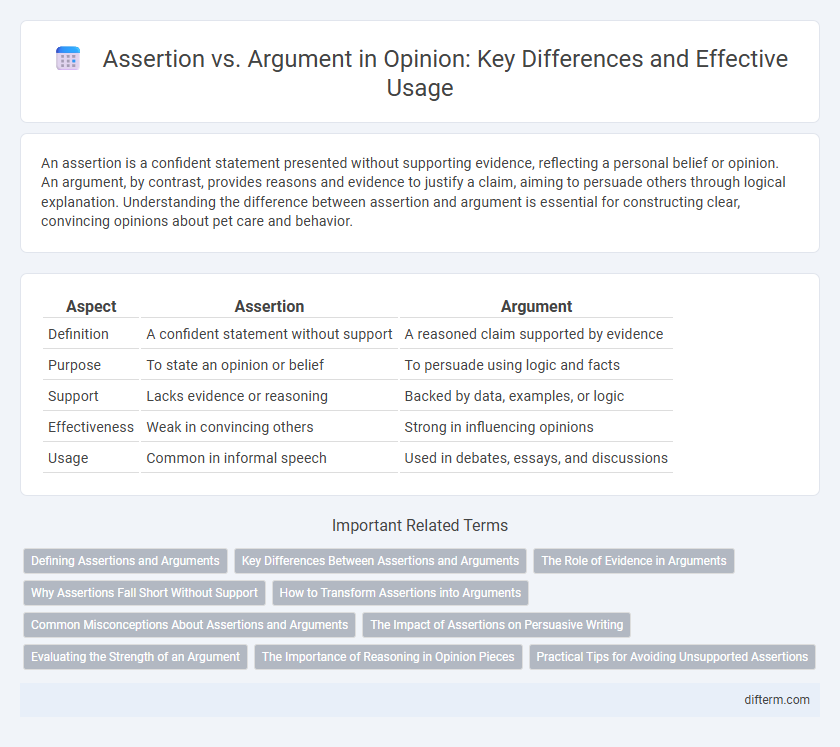An assertion is a confident statement presented without supporting evidence, reflecting a personal belief or opinion. An argument, by contrast, provides reasons and evidence to justify a claim, aiming to persuade others through logical explanation. Understanding the difference between assertion and argument is essential for constructing clear, convincing opinions about pet care and behavior.
Table of Comparison
| Aspect | Assertion | Argument |
|---|---|---|
| Definition | A confident statement without support | A reasoned claim supported by evidence |
| Purpose | To state an opinion or belief | To persuade using logic and facts |
| Support | Lacks evidence or reasoning | Backed by data, examples, or logic |
| Effectiveness | Weak in convincing others | Strong in influencing opinions |
| Usage | Common in informal speech | Used in debates, essays, and discussions |
Defining Assertions and Arguments
Assertions are clear, confident statements that express a claim or belief without requiring immediate evidence or explanation. Arguments consist of a series of logically connected premises designed to support a conclusion, relying on evidence and reasoning for validation. While assertions state what is believed to be true, arguments provide the justification that persuades others of that truth.
Key Differences Between Assertions and Arguments
Assertions present statements or claims without providing evidence or reasoning, often reflecting personal beliefs or opinions. Arguments build upon assertions by offering logical reasoning and supporting evidence to persuade or validate the claim. Understanding this distinction is crucial for effective critical thinking and clear communication in debates and written discourse.
The Role of Evidence in Arguments
Evidence serves as the backbone of effective arguments by providing concrete support that validates claims and persuades audiences, distinguishing arguments from mere assertions. Assertions often lack substantiation and rely on subjective opinions, while arguments are grounded in verifiable data, facts, and logical reasoning. The role of evidence is crucial in establishing credibility, fostering rational discourse, and enabling critical evaluation of differing viewpoints.
Why Assertions Fall Short Without Support
Assertions fall short without support because they lack the necessary evidence and reasoning to persuade critical thinkers or skeptics. Without factual data, logical explanations, or credible sources, assertions remain unsubstantiated claims that fail to establish trust or credibility. Effective arguments rely on underlying support to convert assertions into convincing and defensible positions.
How to Transform Assertions into Arguments
Transforming assertions into arguments requires providing evidence and logical reasoning to support the initial claim, increasing its credibility. Effective arguments incorporate relevant data, examples, or expert testimony to validate the assertion and persuade the audience. Clarity in defining terms and addressing potential counterpoints strengthens the argument's overall impact.
Common Misconceptions About Assertions and Arguments
Many people mistakenly believe that assertions and arguments are interchangeable, but assertions are simply statements presented without supporting evidence, whereas arguments consist of claims backed by logical reasoning and evidence. Another common misconception is that all arguments are aggressive, while in reality, arguments can be constructive and aim to persuade through rational discussion. Understanding the distinct roles of assertions and arguments enhances critical thinking and effective communication.
The Impact of Assertions on Persuasive Writing
Assertions in persuasive writing serve as confident declarations that establish a firm stance, influencing readers through perceived authority and certainty. Unlike arguments, which rely on evidence and logical reasoning, assertions shape the tone and can either strengthen or weaken credibility depending on their alignment with factual support. Effective use of assertions enhances persuasion by appealing to emotions and reinforcing key points, but overreliance may undermine the writer's trustworthiness if not adequately substantiated.
Evaluating the Strength of an Argument
Evaluating the strength of an argument requires analyzing the evidence, logic, and relevance supporting the claim rather than merely accepting the assertion. Strong arguments rely on credible sources, clear reasoning, and consistent data, while weak assertions often lack substantiation or contain logical fallacies. Critical judgment in distinguishing robust arguments from mere assertions enhances decision-making and promotes informed discussions.
The Importance of Reasoning in Opinion Pieces
Reasoning is crucial in opinion pieces as it transforms subjective assertions into persuasive arguments backed by evidence and logic. Without sound reasoning, opinions risk being dismissed as mere personal beliefs rather than thoughtful analyses. Effective use of reasoning enhances credibility and engages readers by demonstrating the validity of the viewpoint presented.
Practical Tips for Avoiding Unsupported Assertions
Avoid unsupported assertions by grounding every claim in credible evidence such as statistics, expert testimony, or documented examples. Clearly define key terms to prevent ambiguity and ensure your argument remains focused and precise. Anticipate counterarguments to strengthen your position and demonstrate thorough understanding of the topic.
Assertion vs Argument Infographic

 difterm.com
difterm.com